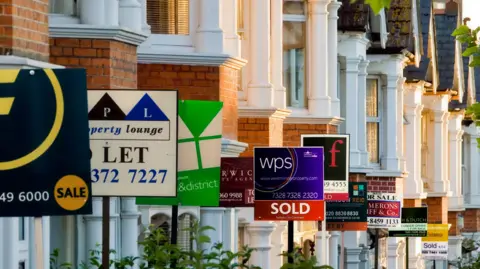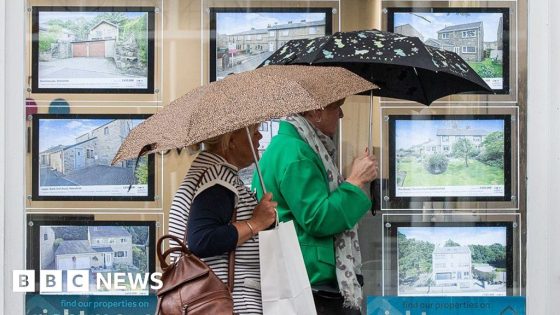 Getty Images
Getty ImagesUK house prices in September rose by 3.2% compared with a year ago – the fastest rate for nearly two years, according to Nationwide.
The building society said that annual growth was the highest since November 2022, with terraced homes driving the increase.
It said rising incomes and mortgage rate cuts were improving affordability for buyers.
The average UK house price in September was £266,094, it said.
Nationwide’s data, which is based on its own mortgage lending, showed that UK prices rose by 0.7% in September compared with the previous month. August had recorded a slight fall on the monthly measure.
“Income growth has continued to outstrip house price growth in recent months while borrowing costs have edged lower amid expectations that the Bank of England will continue to lower interest rates in the coming quarters,” said Nationwide’s chief economist, Robert Gardner.
“These trends have helped to improve affordability for prospective buyers.”
However, he said that while activity in the housing market and prices had picked up, they remained subdued compared with historical standards.
Amy Reynolds, head of sales at estate agency Antony Roberts, said: “While sellers may be encouraged by these price rises, we find if a property is too highly priced, applicants don’t waste their time and view.
“So if a property isn’t getting viewings, it is likely to be down to price, and the best advice we can give is to bring that price down to the market level.”
Mortgage competition
The latest survey comes as competition has intensified between lenders in recent months.
Brokers say that providers have been offering the best deals to new, house-purchasing customers, rather than those who are remortgaging.
Nationwide, which is the UK’s largest building society, recently announced new borrowers could request a mortgage up to six times their total income with a 5% deposit, but it would only be available for those taking out a five or 10-year fixed-rate deal.
Other lenders have also been lowering the rates of interest they charge.
However, the cost of a mortgage deposit, as well as the monthly repayments, remain major hurdles for potential first-time buyers.
Figures from the Bank
House prices have been relatively stagnant in the last year, as activity in the UK housing market has been limited.
But many commentators suggest, with interest rates expected to fall, demand from buyers could now pick up.
In a further sign of increased activity, figures from the Bank of England show that lenders have approved the highest number of mortgages for house purchases since just before the mini-budget during the premiership of Liz Truss.
They approved 64,900 mortgages for house purchases in August, up from 62,500 in July. This was the highest since August 2022 and more than analysts had expected.
House prices have been relatively stagnant in the last year, as activity in the UK housing market has been limited.
But many commentators suggest, with interest rates expected to fall, demand from buyers could now pick up.
Terraced homes in demand
Nationwide said that terraced homes had seen the biggest price increases in the past year, up 3.5% on average.
Semi-detached houses and flats saw increases of 2.8% and 2.7% respectively, with detached houses up 1.7%. However, larger homes had shot up in price during the so-called race for space during the Covid pandemic.
The Nationwide survey only takes into account buyers with mortgages and does not include those who purchase homes with cash or buy-to-let deals. Cash buyers account for around a third of housing sales.
Rival lender, the Halifax, will publish its house price index for September in the coming days.
Source Agencies




